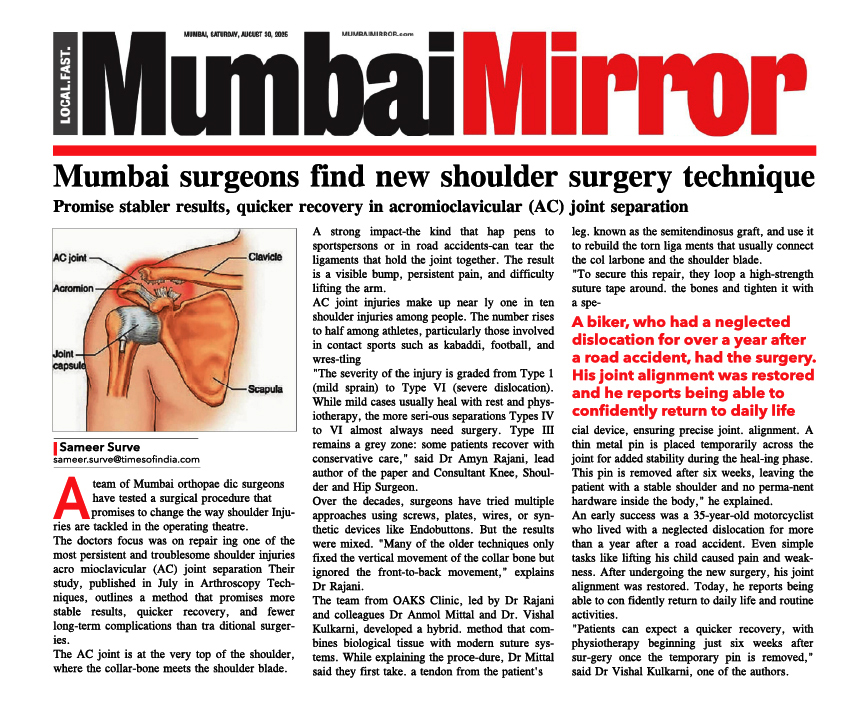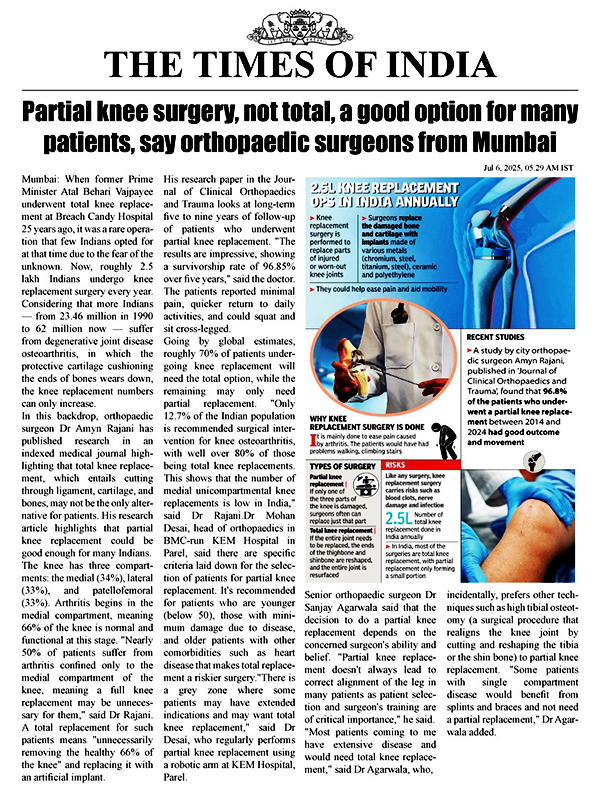Joint replacement surgery has advanced significantly over the years, offering patients a chance to regain mobility and live pain-free lives. Among the most transformative innovations is minimally invasive joint replacement surgery, which has become a game-changer in the field of orthopaedics. Leveraging cutting-edge technologies, this approach ensures faster recovery, reduced pain, and minimal scarring, making it an attractive option for patients. This blog explores the new technologies in joint replacement, minimally invasive techniques, personalized surgery, and the promising future of joint replacement procedures.
New Technologies in Joint Replacement Surgery
The evolution of technology has paved the way for more precise, effective, and patient-friendly joint replacement surgeries. Below are some of the latest advancements reshaping the field:
- Robotics-Assisted Surgery
- Robotics is revolutionizing joint replacement procedures. Robots assist surgeons in planning and executing surgeries with pinpoint accuracy. These systems use 3D imaging to map out the patient’s anatomy, allowing surgeons to position implants with unmatched precision.
- This technology minimizes human error, reduces the risk of complications, and improves the lifespan of the implants.
- 3D Printing for Custom Implants
- 3D printing technology enables the creation of custom implants tailored to a patient’s unique anatomy. This ensures a better fit, improved function, and a natural range of motion post-surgery.
- Custom implants are especially beneficial for complex cases or patients with significant bone loss.
- Improved Implant Materials
- Advances in material science have led to the development of durable and biocompatible implants. Modern implants are designed to mimic natural joint movement while resisting wear and tear.
- Materials such as highly cross-linked polyethylene and advanced ceramics enhance longevity and reduce the risk of revision surgery.
- Augmented Reality (AR) and Artificial Intelligence (AI)
- AR provides surgeons with enhanced visualizations of the joint during surgery, improving accuracy. AI assists in preoperative planning by analyzing patient data and suggesting the best surgical approach.
- Together, these technologies ensure personalized and efficient care for patients.
Minimally Invasive Joint Replacement Surgery
Minimally invasive joint replacement surgery is a technique that uses smaller incisions and refined surgical methods to reduce trauma to the surrounding tissues. This approach has revolutionized the way joint replacement surgeries are performed.
Key Features of Minimally Invasive Surgery
- Smaller Incisions: Traditional joint replacement surgery typically requires large incisions, but minimally invasive methods use incisions that are only 3-5 inches long.
- Less Muscle Disruption: The technique avoids cutting through major muscles, reducing pain and facilitating quicker recovery.
- Reduced Blood Loss: With minimal damage to tissues, blood loss is significantly reduced, leading to fewer complications.
- Shorter Hospital Stay: Patients often leave the hospital within 1-2 days compared to 3-5 days for traditional surgery.
Types of Minimally Invasive Procedures
- Knee Joint Replacement: Surgeons make a small incision to access the knee joint, allowing for faster recovery and minimal scarring.
- Hip Joint Replacement: Using anterior or posterior approaches, surgeons replace the hip joint with smaller incisions, reducing the risk of dislocation.
- Shoulder Joint Replacement: Arthroscopic techniques are often combined with minimally invasive methods for better outcomes.
Benefits for Patients
- Quicker return to daily activities
- Lower risk of infection
- Reduced postoperative pain and reliance on painkillers
- Improved cosmetic outcomes
Patients seeking minimally invasive joint replacement surgery often choose experienced surgeons like an arthroscopic surgeon in Mumbai who specialize in these advanced techniques.
Personalized Joint Replacement Surgery
Personalized medicine is shaping the future of joint replacement surgery, with treatments tailored to meet the unique needs of each patient.
Customized Surgical Plans
- Advanced imaging techniques like MRI and CT scans are used to create detailed maps of a patient’s joints. These maps guide surgeons in planning the optimal surgical approach.
Patient-Specific Implants
- Traditional implants are designed in standard sizes, but patient-specific implants are crafted to fit each individual’s anatomy perfectly.
- Customization ensures better alignment, increased comfort, and longer-lasting results.
Prehabilitation Programs
- Personalized prehabilitation involves exercises and therapies designed to strengthen the joint and surrounding muscles before surgery. This approach enhances recovery and ensures better outcomes.
Lifestyle Considerations
- Personalized joint replacement surgery also takes into account the patient’s age, activity level, and long-term goals. For example, an active individual may receive a different type of implant compared to someone with a sedentary lifestyle.
Choosing a joint replacement specialist in Mumbai ensures access to the latest personalized surgical methods, helping patients achieve the best possible outcomes.
Future of Joint Replacement Surgery
The future of joint replacement surgery is incredibly promising, with innovations poised to make the process even safer, more effective, and accessible. Below are some trends to watch for:
- Smart Implants
- Future implants may come equipped with sensors that monitor joint health, detect wear and tear, and alert both the patient and surgeon to potential issues.
- These smart implants will enable proactive care and reduce the need for revision surgeries.
- Regenerative Medicine
- Scientists are exploring the use of stem cells and tissue engineering to regenerate damaged cartilage and bones. This approach could delay or eliminate the need for joint replacement in some patients.
- Enhanced Robotics and AI Integration
- Robotics and AI are expected to play an even greater role in joint replacement surgeries, making procedures quicker and more precise.
- Real-time AI-guided surgery could become a standard practice, ensuring optimal results for every patient.
- Outpatient Joint Replacement
- Minimally invasive techniques and advancements in anesthesia are making same-day joint replacement surgeries more common. Patients can recover at home, reducing costs and hospital-associated risks.
- Patient-Centric Care Models
- Future care models will prioritize patient engagement, with apps and wearables helping patients track their recovery progress and maintain communication with their healthcare team.
Why Choose a Specialist in Mumbai for Joint Replacement?
Mumbai is a hub for advanced orthopaedic care, offering access to skilled professionals and state-of-the-art facilities. Choosing an experienced knee joint replacement specialist in Mumbai or an arthroscopic surgeon ensures:
- Comprehensive care tailored to individual needs
- Expertise in minimally invasive and robotic-assisted surgeries
- Access to cutting-edge technology and implants
Patients in Mumbai can expect world-class treatment that aligns with global standards, ensuring faster recovery and improved quality of life.
Conclusion
Minimally invasive joint replacement surgery represents a gentle and effective approach to restoring mobility and relieving pain. With advancements in technology, personalized care, and the dedication of skilled professionals, joint replacement has become safer and more efficient than ever. For those considering joint replacement, consulting a trusted joint replacement specialist in Mumbai or an arthroscopic surgeon in Mumbai is the first step toward a healthier, more active life. As the future of joint replacement continues to evolve, patients can look forward to even greater innovations that promise improved outcomes and enhanced quality of care.
About Dr. Amyn Rajani – A leading arthroscopic surgeon in Mumbai
Dr. Amyn Rajani is a renowned arthroscopic surgeon in Mumbai and a leading expert in joint replacement surgery. With years of experience and a patient-centric approach, he specializes in minimally invasive and robotic-assisted procedures, ensuring the best outcomes for his patients. Dr. Rajani’s commitment to using cutting-edge technology and providing personalized care makes him a trusted name in the field of orthopaedics. Whether you need a knee, hip, or shoulder replacement, Dr. Rajani offers comprehensive solutions tailored to your unique needs.
Book your consultation today and take the first step towards pain-free mobility!
Location: OAKS Clinic, Mumbai: https://g.co/kgs/f4L4sNS
Contact: 91-88989 75355 / 91-22-23619137





